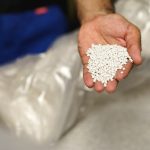Polyethylene terephthalate (PET) is widely used in the plastic industry. In fact, it represents more than 50% of world production of synthetic fibers. Its structure containing an aromatic ring gives polymer stiffness and strength, properties highly desirable in plastics. However, due to the environmental impact concern, sustainable options for its production are constantly being explored. Among them, the use of recyclable and post-consumer resins (PCR) is being offered to the market. PCR is a material made from recycled plastic, such as water and beverage bottles and other packaging. Its recycling involves sorting by type and thoroughly cleaned before being processed into new plastic flakes, pellets, or powder for reuse as PCR resin. Only physical treatment is involved. In order to improve recycling products quality and to diversify its reuse, PET chemical transformations methods have also been developed1.In fact, depolymerization to obtain the corresponding monomers terephthalic acid (TA) and ethylene glycol (EG) (figure) has been tested using different approaches

For instance, the use of microwave reactor under alkaline conditions at temperatures range of 200-250 oC and pressures of 203-290 psi with further addition of acid to obtain the corresponding monomers (TA and EG). A reactor with CO2 under supercritical conditions (ca. above 31 oC and 1.081 psi) is also being reported2 to efficiently hydrolyze PET scrap to TA and EG. Supercritical methanol has also being used3 for PET methanolytic depolymerization. These procedures are quite convenient since monomers recovered can be reuse to obtain high quality PET.
To extend PET reuse, other decomposition processes have been also reported1:
Gasification with O2 and/or steam to produce synthesis gas (CO + H2)
Thermal decomposition using an inert gas
Catalytic cracking and reform
Hydrogenation using heat and H2
1.- M. Crippa, B. Morico, Stud.Surf.Sci.Catal., 170 (2020) 215-219
2.- University of Wyoming/Washington State University Patent application 20210340351. Dec. 16,2021
3.- Y. Yang Y. Lu H..Xiang Y Xu, Y.Li, Polym. Degrad.Stab. , 75, 1 (2002) 185-191





